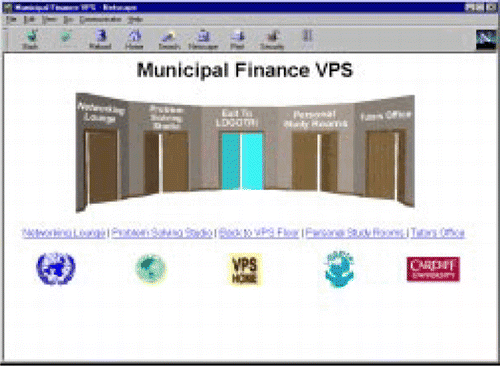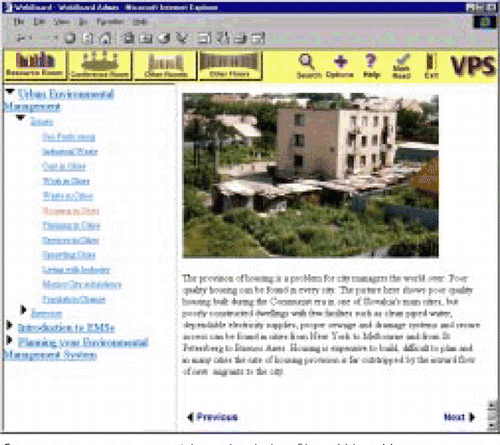This article explores a new teaching pedagogy which provides a learning environment for students studying urban issues and policies; it uses a combination of Web based distance learning and on-line expert tutors. This method allows flexible study modes for the students and tutors, and transcends barriers of office hours, global time-zones and physical location.
Collaborative learning is particularly important in the education and training of urban managers and planners (CitationUNESCO, 1998). Networking between policy makers and the public within a city, between cities and between countries should result in a more efficient process of policy evaluation and innovation diffusion (CitationHealy, 1997). The Internet provides an efficient flexible tool for educating managers whilst also providing the tools and skills required for international networking (CitationStiles, 2000). In the learning environment outlined below on Asian cities (and the Virtual Policy Studio), interaction can be engineered by carefully structured exercises and tutor on-line expert intervention in collaborative problem-solving ‘rooms’. Active collaboration between participants proves less useful than the tutorparticipant interaction. The study mode of the participants in this example was part-time, mixed work/home study, and remote (other countries).
Institutional capacity building in Asian cities: the context
Asia is rapidly urbanizing and so is poverty. Within the next two decades, a majority of the population will live in urban areas and a majority of the urban population will be poor. Poverty is not just a lack of income, but also of physical and social assets and of recognition and influence that prevents the poor playing the role of contributor to, and beneficiary of, development. Local governments will have an increasing role to play in poverty alleviation. Through measures such as the provision of basic infrastructure (to improve living conditions), the application of good governance (to enhance participation) and urban economic development (to increase the demand for labour, goods and services), local governments can support and empower the urban poor to improve their situation. However, many local government staff lack the knowledge and skills to work with and for the urban poor.
Urban poverty alleviation is only one of many new tasks for local governments; others include urban environmental management, monitoring of privatised infrastructure and services, city marketing and investment promotion. Having to assume roles and responsibilities previously within the domain of the central government, local governments are entering new and uncharted territory. To perform their tasks well, local government staff need a better understanding of their new situation and of the experience of others to enable them to develop new responses to old and new challenges. Effective responses often require changes in the organisational arrangements within local governments and institutional arrangements between government departments. An effective and efficient local government requires a new government culture and government staff with new knowledge, skills and attitudes. Local governments all over the world are confronted with these challenges and are searching for answers. The challenge of making cities ‘work’ is more than a local government issue however. More generally, the requirement is to build the institutional capacity of urban governance at all spatial levels and in each sector. This includes voluntary organizations, NGOs and private firms. Urban services are not so easily categorised into public and private these days. Self organised neighbourhood groups in Bangladesh supply their own garbage collection services. Water cleansing plants in India are built under privatepublic partnerships. Private manufacturing firms in China provide housing, security, and educational services for employees. Entrepreneurial neighbourhood firms supply professional classes in Jakarta and Manila with private environmental management and local planning. Rapidly growing cities struggling against economic, environmental and political hardships require a well-meshed matrix of agencies each contributing to the institutional infrastructure of urban ‘governance’.
Virtual Policy Studios (VPS)
The VPS project is a joint venture between the Centre for Education in the Built Environment (CEBE) at Cardiff University, the Asian Institute of Technology and the UN Economic and Social Commission for Asia and Pacific Human Settlements Division. It is a prototype capacity building tool (CitationUrban Management Centre, 2000) designed to foster the exchange of innovation and best practice among managers of Asia’s cities and to encourage thoughtful adaptation and adoption of new urban management approaches. VPS provides a virtual collaborative learning space containing online learning and teaching material, case studies, exercises, discussions and online experts. PLANET readers are invited to take a look at the Municipal Finance VPS (MFVPS) that ran during the spring of 2000 (CitationJohns and Webster, 1999). Students of Urban Geography or the Geography of Development will find some fascinating case study material here and may be interested in using it for essays, projects and disser tations. Participants of the MFVPS are mid to senior level government officers in cities such as Manila, Bangkok and Delhi and the VPS offers insights into what it is like to manage such complex cities. Persistent students might find their way through the virtual corridors of the MFVPS building to another VPS - on Environmental Management Systems. This has less discussion in it but more resource material and more graphics. It should be of interest to those undertaking project work on urban environments. The two figures give a flavour of the VPS learning environment.
The VPS differs from many other managed virtual environments in having a very fast development time. It is effectively a Web based threaded discussion list intimately linked to a Web page based resource library and online links. The threading is used to organise and manage the flow of learning, the material to be accessed, the exercises to be undertaken, the responses from the participants and the feedback from the tutors or on-line experts. It also provides collaborative discussion and learning spaces, and communication links between tutor and participants etc. The use of the Web based discussion list also takes care of participant registration, authentication, progress tracking and allows for subsequent statistical analysis.
Although Internet delivered teaching has been used for many years now for a large range of disciplines, its potential in training professional planners in the workplace seems to have been largely ignored. The specific niche of collaborative learning in the networked environment in which policy makers work remains still to be utilised. The VPS project therefore offers new learning opportunities for both students and for practising professionals.
References:
- HealeyP. (1997) Collaborative Planning: Shaping Places in Fragmented Societies, Macmillan, London.
- JohnsJ and WebsterW. (1999) Municipal Finance VPS: Internet-based Training Workshop on Municipal Finance for the Network of Local Government Training and Research Institutions in Asia and the Pacific [online]. Cardiff University. Available from HtmlResAnchor http://t062.cpla.cf.ac.uk/wbimages/mfvps/intro/intro.html [Accessed 20 December 2000].
- Stiles, M J. (2000) Effective Learning and the Virtual Learning Environment. Proceedings: EUNIS 2000 - Towards Virtual Universities, Instytut Informatyki Politechniki Poznanskiej, Poznan April 2000, The Learning Development Centre, Stafordshire University, UK. 2000.
- UNESCO (1998) Educational Innovation for Sustainable Development: Proceedings of the Third UNESCO-ACEID (Asia-Pacific Centre of Educational Innovation for Development) International Conference, held in Bangkok December 1-4, UNESCO Principal Regional Office PO Box 967 Bangkok 10110, Thailand.
- Urban Management Centre (2000). Capacity Building. Asian Institute of Technology, Thailand. Available from HtmlResAnchor http://www.hsd.ait.ac.th/umc/cb/cb.html [Accessed 20 December 2000].

